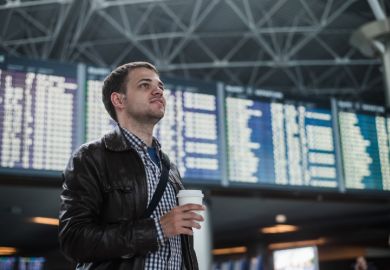Covid-19 border closures have ushered in new approaches to student mobility that practitioners believe will never be wound back, even after borders reopen for good.
A Times Higher Education forum heard that opportunities for international experience have flourished in places where traditional exchanges are rare, with scarce resources or cultural impediments discouraging many students from travelling.
Vidya Yeravdekar, pro-chancellor of Symbiosis International University in western India, said as few as 1 per cent of the 45,000-odd students at her institution had the means to undertake travel abroad. But the virtual exchanges organised during the pandemic had touched the “98 or 99 per cent of students who will never experience internationalisation in its true sense”.
“We could connect students who would have otherwise not been able to [with] wonderful students [and] teachers from across the world,” Dr Yeravdekar told THE Campus Live Asia, also conducted virtually. “I’m sure a day will come when these students will visit each other’s countries. They’ll be friends, buddies, and these will grow into lifelong relationships.”
Rio Luhung, international partnerships coordinator at Indonesia’s Sultan Agung Islamic University, said virtual exchanges conceived as the only viable option during the pandemic had proven a blessing in disguise. “The number of students involved in our international programmes [has been] way higher than…normal,” he told the forum.
Mr Luhung said students had embraced the experience, connecting with their overseas peers through social media after classes and gaining a “taste” for foreign travel in a culture where “going abroad is not a big thing”.
Guangcui Zhang, director of the office of global engagement at Jilin University in northern China, said providing individual internationalisation experiences had long been a challenge in her institution of 73,000 students. But an “encouraging” 10,000 students had participated in online exchanges over the past two years.
She said a survey conducted during the pandemic’s early stages had revealed a “decline of interest in going abroad physically”, but no decrease in appetite for international collaborations. Her office had helped academics “tailor-make” virtual exchanges involving lessons, workshops, seminars, tutorials and international competitions, with Jilin students claiming gold medals in life sciences and automotive tournaments.
Dr Zhang said physical mobility was not the “assessment standard” for such activities. “It’s whether we meet the expectations and the needs of the students.”
Joyce Teo, vice-president of global affairs at Universiti Brunei Darussalam, said her institution had embraced the “rising trend” of virtual exchanges as a means of arming students with intercultural competencies.
Dr Teo said that while the full resumption of international travel was keenly anticipated, she expected a “hybrid” mode of mobility to prevail in the future. Student feedback was that virtual exchanges were “easier” and more fulfilling in some ways. “You’re meeting more professors. You’re meeting friends that otherwise you wouldn’t be able to.”
Dr Yeravdekar said the pandemic had also helped many academics overcome their “reluctance and anxiety” about collaborating internationally. “Now [they] don’t mind talking to a person from Germany or Norway or even eastern India, because [they’ve] developed a network [and] comfort with talking to someone from another country. We can converse with each other. We can brainstorm. We can develop joint research projects. I think that’s the biggest takeaway.”
Register to continue
Why register?
- Registration is free and only takes a moment
- Once registered, you can read 3 articles a month
- Sign up for our newsletter
Subscribe
Or subscribe for unlimited access to:
- Unlimited access to news, views, insights & reviews
- Digital editions
- Digital access to THE’s university and college rankings analysis
Already registered or a current subscriber?










